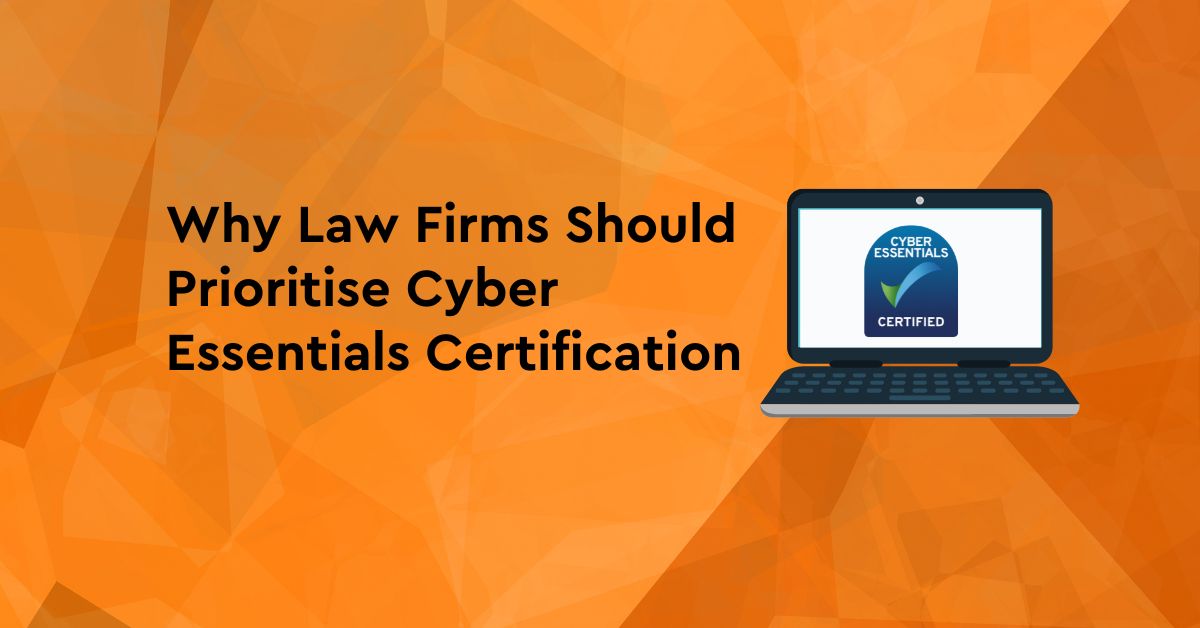In today’s digital-first legal landscape, cyber security is a critical aspect of trust, compliance, and operational resilience. For law firms handling sensitive personal and financial information on behalf of clients, the stakes are even higher. From confidential case files to transactional data, the information held by legal practices is a prime target for cybercriminals.
Cyber Essentials is a government-backed accreditation designed to help organisations defend against the most common types of cyber attacks. It is designed to ensure a baseline of cyber hygiene through practical and effective security controls.
For law firms, this isn’t just about ticking a compliance box—it’s about building trust, safeguarding client confidentiality, and securing operational continuity.
Why Cyber Essentials Matters for Law Firms
Law firms are prime targets for cyber criminals. From phishing attacks to hacking and password breaches, even a basic vulnerability can lead to a major data compromise. Alarmingly, in 2024 a study analysing over 5,000 UK law firms found that fewer than 20% had Cyber Essentials certification. This leaves the vast majority exposed to risk and potentially in breach of regulatory obligations.
Benefits in Practice
Firms that achieve Cyber Essentials often find the process enhances their overall IT policies and culture. For example, one firm introduced stricter email security, multi-factor authentication for remote work, and better access control protocols. Another noted that certification made obtaining cyber risk insurance more straightforward and cost-effective.
Additionally, holding Cyber Essentials certification is increasingly a factor when bidding for work, not only in the public sector but also in private supply chains. It demonstrates that the firm takes cyber threats seriously and has the foundations in place to prevent them.
For law firms, it offers not only protection, but also validation. Here’s why it’s more important than ever:
1. Protecting Sensitive Client Data Law firms manage a vast amount of confidential data including client data, financial information, contracts, and case notes. A data breach can cause irreparable damage to a firm’s reputation and could even lead to legal consequences. Cyber Essentials helps law firms put basic but effective controls in place to protect this data from unauthorised access or theft.
2. Meeting Regulatory Expectations The legal industry is highly regulated, and failure to secure client information can result in fines, professional disciplinary action, or loss of accreditation. The Law Society’s Lexcel quality mark encourages Cyber Essentials as part of best practice information management. Additionally, any firm working with the public sector must be Cyber Essentials certified to remain in scope for government contracts.
3. Enhancing Client Confidence Today’s clients are cyber-aware and want reassurance that their legal representatives are taking data protection seriously. Cyber Essentials certification shows clients and suppliersthat the firm follows best practice when it comes to digital security. It builds trust and positions the firm as a credible, secure choice in an increasingly competitive market.
4. Smoother Access to Insurance Cyber insurance is becoming a necessity for law firms, especially those handling high-value transactions or client funds. Many insurers now require firms to have Cyber Essentials certification as part of their due diligence process and some even offer lower premiums for firms who are accredited.
5. Business Continuity and Resilience Cyber attacks can cause major disruption to a legal practice locking files, paralysing communication systems, or even halting services entirely. Certification encourages firms to implement robust controls like secure firewalls, updated software, multi-factor authentication, and stronger password protocols—all vital for ensuring operational continuity.
6. Competitive Advantage In a sector where reputation is everything, having Cyber Essentials in place can give firms a distinctive edge. It shows forward-thinking leadership, a commitment to client protection, and alignment with national standards qualities that are increasingly important for referral networks and B2B engagements.
7. Low-Cost, High-Impact Compliance For all its benefits, Cyber Essentials is remarkably accessible. The certification process is straightforward and cost-effective, especially compared to the potential fallout of a cyber incident. It’s a proactive step that pays dividends in both risk mitigation and client trust.
We Can Help You Achieve Certification At OneTechUK, every law firm we work with is Cyber Essentials certified, and we’re proud to support them in achieving and maintaining that status.
As an IT and Telecoms provider specialising in the legal sector, we’ve helped countless law firms achieve Cyber Essentials and Cyber Essentials Plus. Our team will guide you through both levels of certification, ensuring your systems are audit-ready, compliant, and protected against the most common cyber threats. We help simplify the technical jargon, prepare your systems, and build a culture of cyber awareness within your team.


